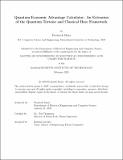Quantum Economic Advantage Calculator: An Extension of the Quantum Tortoise and Classical Hare Framework
Author(s)
Mejia, Frederick
DownloadThesis PDF (1.609Mb)
Advisor
Thompson, Neil
Terms of use
Metadata
Show full item recordAbstract
For some algorithmic problems, quantum computation has the potential to provide enormous speedups over classical computers. However, the drastic slowdowns associated with running error-free quantum hardware make achieving these theoretical advantages challenging. Researchers and industry leaders planning for the future would benefit from understanding when it will be both feasible and advantageous to switch to quantum computing platforms. This thesis builds on the framework by Choi, Moses, and Thompson (2023) to evaluate the feasibility and timeline for achieving Quantum Economic Advantage (QEA)—the point at which quantum hardware can outperform comparably-priced classical machines for specific computational tasks. This thesis substantially extends and deepens this framework and introduces a calculator to make these analyses accessible. The model incorporates parameters from quantum hardware vendors, such as physical-logical qubit ratios and overall connectivity, alongside the computational complexities of specific problems, to estimate the year of QEA. Most of the parameters in the tool are freely adjustable, allowing users to explore how varying assumptions about quantum improvement and technological advancement influence the projected timeline for QEA.
Date issued
2025-02Department
Massachusetts Institute of Technology. Department of Electrical Engineering and Computer SciencePublisher
Massachusetts Institute of Technology